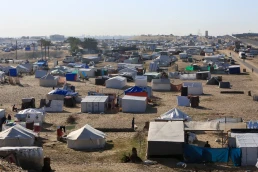It is time to demand world leaders sign a fossil fuel nonproliferation treaty, says Ukrainian climate activist Svitlana Romanko.
By Amy Goodman, Bill McKibben, Svitlana Romanko, Democracy Now!
A new report from the United Nations Intergovernmental Panel on Climate Change warns the opportunity to mitigate the worst effects of global warming by maintaining global temperatures at 1.5 degrees Celsius is quickly closing and that humanity has less than three years to slash greenhouse gas emissions. “Fossil fuel is at the root of our problems. It is at the root of the despotisms we see in Russia or in Saudi Arabia or indeed the Koch brothers’ efforts to deform our own democracy,” says Bill McKibben, environmentalist and founder of 350.org. It is time to demand world leaders sign a fossil fuel nonproliferation treaty, says Ukrainian climate activist Svitlana Romanko. Romanko is also with the Laudato Si’ Movement, which exists to implement the second encyclical of Pope Francis about “care for our common home” and recognizes the war in Ukraine has been funded by fossil fuels. Pope Francis says he plans to visit Ukraine, and Romanko says his “leadership may create a difference in this war.”

MY GOODMAN: I wanted to go to the new U.N. report that just came out, the United Nations warning Monday humanity has less than three years to slash greenhouse gas emissions nearly in half in order to prevent the most catastrophic effects of the climate crisis. In this major new report, scientists with the U.N.’s Intergovernmental Panel on Climate Change, the IPCC, find that without immediate and dramatic action, it will be impossible to limit global temperature rise to 1.5 degrees Celsius above pre-industrial levels. U.N. Secretary-General António Guterres said the report documents a litany of broken climate promises by nations.
SECRETARY–GENERAL ANTÓNIO GUTERRES: It is a file of shame, cataloging the empty pledges that put us firmly on track towards an unlivable world. We are on a fast track to climate disaster — major cities underwater, unprecedented heat waves, terrifying storms, widespread water shortages, the extinction of a million species of plants and animals. And this is not fiction or exaggeration. It is what science tells us will result from our current energy policies.
AMY GOODMAN: I want to get both of your actions to this climate report, beginning with Bill McKibben, getting lost, to say the least, in the top news of Russia’s war on Ukraine. But the significance of this and how it directly connects to the war?
BILL McKIBBEN: Well, yeah, I mean, first of all, it’s not as if there’s something brand new in what they said, but what’s new is the tone. I mean, every time the IPCC issues another report, we’re further down this road without having done anything. And it was quite interesting, Amy, to listen to António Guterres, the secretary-general. This man is the top diplomat on the planet, so he’s used to speaking in diplomatic language. He has abandoned that. He’s also the one guy whose political jurisdiction is the whole Earth, and he’s clearly scared.
He said, among other things — I thought this was maybe the most important, and I think Svitlana will agree, because of the amazing work she’s been doing on banks. He said, “At this point it is economically and morally insane to continue new investment in the development of fossil fuels.” And yet, last week we also saw the release of this new report showing that the biggest U.S. banks are doing just that, which is why at Third Act we’ve got this pledge to get people to, at year’s end, cut up their credit cards from Citi and Chase and Wells Fargo and BofA if they haven’t changed.
But that report reminds us that fossil fuel is at the root of our problems. It is at the root of the despotisms we see in Russia or in Saudi Arabia or indeed the Koch brothers’ efforts to deform our own democracy. And it’s also at the root of the biggest existential challenge that we’ve ever faced. Remember, it was late last month when we watched temperatures in the Antarctic climb to 70 degrees Fahrenheit above normal. That’s a horror that connects so deeply with what’s going on in the Ukraine, and they both need to scare us to the, really, core of our beings.
AMY GOODMAN: And, Svitlana, if you can respond, and if you can see this moment, this horror in your own country that’s taking place, as a time when the world turns to renewable energy?
Recent Posts
Why Are Democratic Lawmakers Still Meeting With Netanyahu?
July 12, 2025
Take Action Now Pictures show Democrats like Chuck Schumer standing next to Netanyahu, smiling.By Sharon Zhang, Truthout A bipartisan group of…
Stop Israel’s Dystopian “Humanitarian City” Plan—Before It’s Too Late
July 11, 2025
Take Action Now For the past 20 months, the world has watched—and largely enabled—a genocidal campaign in Gaza. Over 55,000 Palestinians have been…
The “Liberal” International Order Is Criminalizing Palestine Protests
July 11, 2025
Take Action Now As Western governments repress Palestine solidarity and enable Israel’s impunity, the “liberal international order” is no longer…
Politicians Are Betraying Gen Z On Climate
July 10, 2025
Take Action Now While Gen-Zers thrift, knit, crochet, and find other ways to reduce our footprints, Trump and the GOP are greenlighting more climate…




